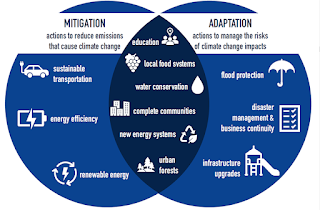It's "Adapt or Die." What we'll pay for ignoring climate adaptation.
I wonder if, in decades to come, we'll see the Covid pandemic as a crisis that kept us from responding to the climate emergency. It's clear now that, when it comes to disasters, we're shit at multi-tasking. One at a time if you don't mind.
Fighting climate change will be enormously costly. Who will pay? How can governments, their treasuries depleted with hundreds of billions of dollars in Covid relief costs, come up with hundreds of billions more for climate change adaptation and mitigation measures?
The UK's Environment Agency chair, Emma Howard Boyd, says the climate emergency poses an "adapt or die" challenge.
Ahead of the UN Cop26 climate talks in Glasgow, the government agency is warning that adaptation – becoming resilient to the already inevitable effects of climate change – is just as important as actions to cut greenhouse gases.It is a case of “adapt or die”, said the Environment Agency’s chair, Emma Howard Boyd, warning that deadly events such as the flooding in Germany this summer would hit the UK if the country did not make itself resilient to the more violent weather the climate emergency was bringing.
The report notes that population growth and climate change will increase water demands and mean that, if no further action is taken between 2025 and 2050, more than 3.4bn extra litres of water a day will be needed for resilient public water supplies.
Hotter drier summers, rising sea levels and pressures from development are adding to water supply issues for people, industry, agriculture, recreational river use and wildlife. With 2C of global warming – below the level of warming for which the world is currently on track – England’s winter rainfall will increase by about 6%, but summer rainfall will be down 15% by the 2050s.
“Adaptation action needs to be integral to government, businesses and communities too and people will soon question why it isn’t – especially when it is much cheaper to invest early in climate resilience than to live with the costs of inaction.”
She added: “While mitigation might save the planet, it is adaptation, preparing for climate shocks, that will save millions of lives.
Canada isn't immune either. We'll argue endlessly about mitigation, cutting emissions, feds versus the provinces, we strenuously avoid the question of adaptation and our nation's vulnerability to climate impacts.
Flashback to 2013 when Calgary's Saddle Dome was awash in flood waters. While that was going on the World Conference on Disaster Management convened in Toronto.
“The frequency and intensity of these events has been increasing at an escalating rate and what was a one-in-100-year event at one time may become the norm,” he said.
Mirza estimated that Canada’s infrastructure requirements have reached a cost of about $1 trillion, while a recent survey by the McKinsey Global Institute earlier this year stated that worldwide infrastructure needs are about $57 trillion.
“In terms of funding, the amounts of money are truly frightening and there’s no government in the world that can find the kind of money necessary to bring existing infrastructure up to par,” Gordon said.
Of course Mirza and Gordon could not have foreseen the global pandemic that arrived in 2020. I hope to have their responses soon.


Comments
Post a Comment